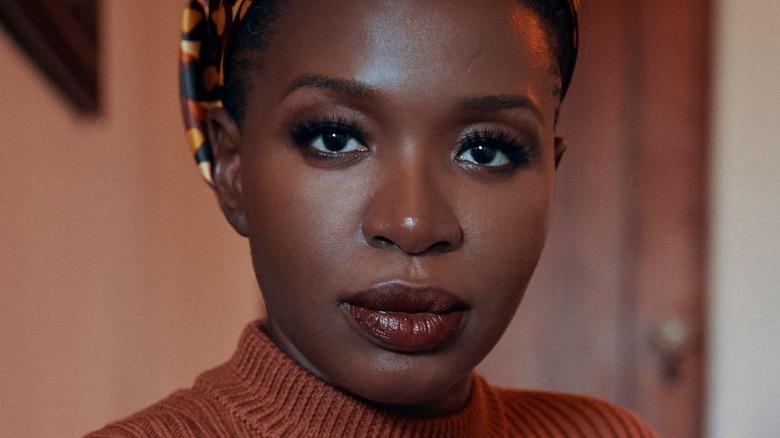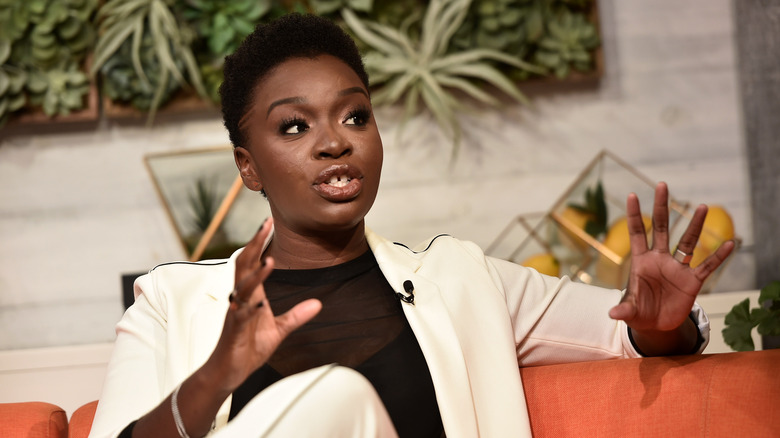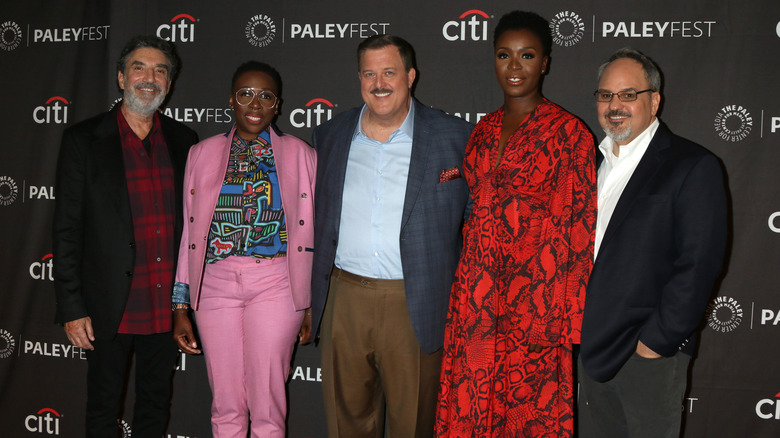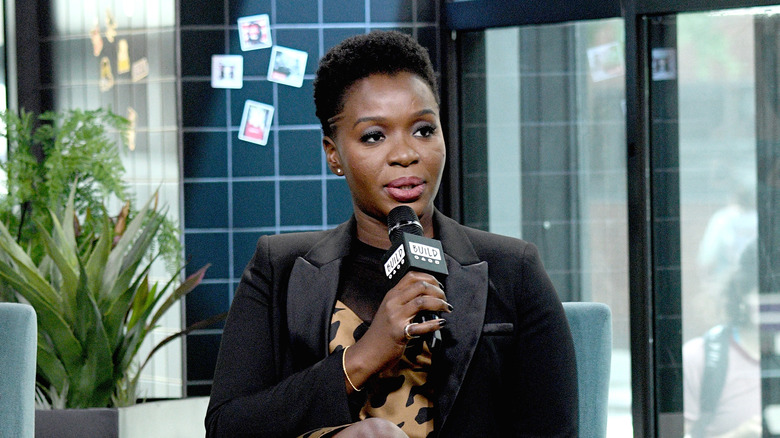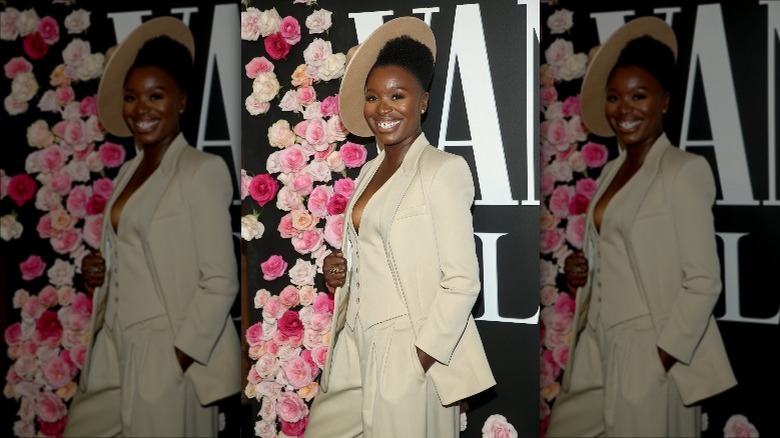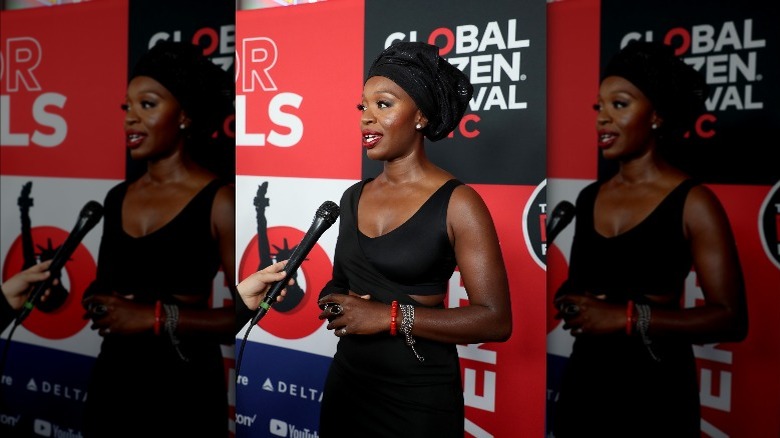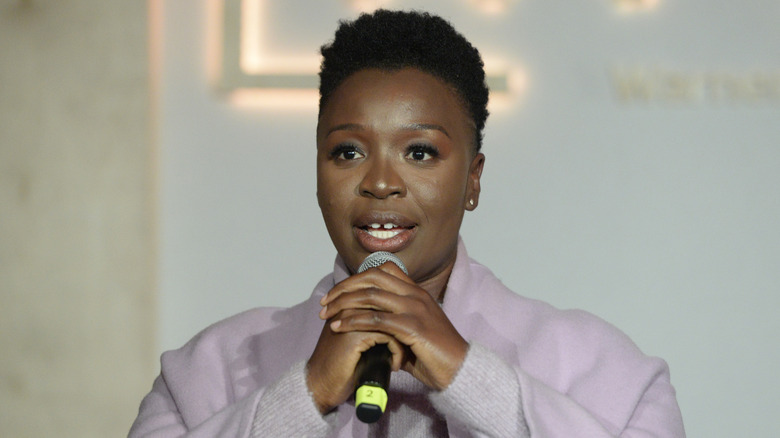Bob Hearts Abishola's Folake Olowofoyeku On Her Longtime Struggle With Endometriosis - Exclusive Interview
Audiences largely first came to know Folake Olowofoyeku in 2019 on the hit CBS comedy "Bob Hearts Abishola." On the show, she plays Abishola, a cardiac nurse and single mom originally from Nigeria who falls for a patient in her care, a middle-aged medical salesman played by Billy Gardell, after he experiences a heart attack.
It's ironic that Olowofoyeku plays a nurse on TV when, in real life, she navigated a decades-long struggle to receive a diagnosis and treatment for severe menstrual pain, which she eventually learned was due to endometriosis, a disease where tissue similar to the uterus' lining grows outside the uterus, per the World Health Organization (WHO). Complicating matters is that she, like her character, grew up in Nigeria, a country where the medical treatment is far behind that of America.
Olowofoyeku is one of over 190 million individuals of reproductive age affected by the disease who have faced similar scenarios, per a study published to Frontiers in Global Women's Health. Not enough is known about endometriosis, largely because it receives little government funding for research compared to other health conditions. This alone makes the disease largely misunderstood and difficult to diagnose — complicated by the fact that some cases known as silent endometriosis have no obvious symptoms – with an official diagnosis only possible through laparoscopic surgery. This often takes many years, per the Endometriosis Foundation of America.
After receiving life-altering laparoscopic excision surgery in spring 2022, the actor is advocating about the disease. Health Digest sat down with Olowofoyeku to learn her story.
Folake Olowofoyeku's 25-year struggle with severe endometriosis pain
I read an interview you did where you shared that your severe symptoms began when you were 13 years old. How did your symptoms impact your life?
In every way. That was my best friend, technically. That was the one consistent thing in my life. It's interesting, because I feel like I'm understanding the effects of it now that I'm outside of it, now that I know what it is to live a normal life. Everything I did revolved around my period. If I had to work, if I had to schedule an event, if I was invited to a wedding, the first thing I would check would be my calendar to see if I could, in fact, make it or not. That's how it affected my life. It was the one consistent thing in my life.
What specific symptoms did you experience?
Excruciating pain, though it was worse when I was younger. From the age of 13, I remember it very clearly because it was 1996, and I was traveling from England back to Nigeria with my family. Every time, I would throw up. I would run to the bathroom to go throw up during the travel, so when we were in the airport, for instance, my mom wouldn't see what was happening. None of my family members would see what was happening, but I would say, "I'm in a lot of pain."
I didn't have a language for it. I'd never experienced it before, and most people think a level of pain is normal during your period. They probably thought it was a normal level of pain, but it wasn't.
No one was seeing what was happening that first time. I remember I didn't have any painkillers or anything. We traveled, and I got back to Nigeria, and slowly as it got worse each month, it became obvious there was something wrong. We don't have very good pain management in Nigeria, still, and certainly not then. What I was given to battle the pain was the equivalent of something milder than Advil. We had Panadol. That's what we call it in Nigeria. That's the No. 1 pain killer that exists, and that didn't work.
From about [age] 13 to when I came to America and even some years after that, I would deal with the pain. I remember when I moved to America, I was told that I could use up to six Motrin every four hours, and I did. It didn't help, and I'm sure it caused more harm than good in the long run. I spent those six to seven days throwing up every day, multiple times a day. That didn't stop until June or July this year. August is when it got better, [so I dealt with the pain] from 1996 until now.
The impact that endometriosis has had on her career
Did your symptoms ever get in the way of your career?
I wouldn't let it. It's the "show must go on" mentality. One time, in college, I was playing Cordelia in "King Lear," and it was one of the heaviest days of my period. I was throwing up backstage, and I remember some of my castmates thought I was hungover, and I couldn't address it because I was in too much pain. Once it's your time to go on stage, I go on stage, say the lines, and come back and crouch in the corner. I wouldn't let it [get in the way].
Now, through the first three seasons of the show, "Bob Hearts Abishola," I was dealing with that as well. [My co-star], Billy [Gardell], was always very thoughtful and always checked in with me to make sure I was okay, but it's the same thing. I would be backstage sitting on a chair and when I hear "Action!" I'd go outside, say my lines, and go back on the chair and into the fetal position.
There's no way to emote it. I don't think I ever cried from it, because the crying was not going to help. After a while, my routine was to lay on the couch [if I was at home], completely devoid of emotion, while experiencing the worst pain imaginable. I'm assuming it looks to somebody else like I'm chilling on a couch.
I wouldn't let it affect my work. If anything, the most impact it had on my productivity was losing momentum. As you're going through the month and things are going okay, [I'll be] in the zone, working out for a good two weeks, and then, bam, I'm shut off for a week. I have to find the momentum again to continue a week after, and that takes about another week, which means that I [only would have] about two weeks of productivity each month. Not to [be able to] talk about the mental anguish when you know that it's about to come up [is hard].
Endometriosis trauma and its effect on mental health
Tell me more about the effect the disease had on your mental health.
The disbelief was almost worse than the pain sometimes. It's because every time I had to switch to a new doctor, part of the dismay of doing so was that now, I had to convince this new person who was going to look at me suspiciously.
One time, I had to bring my friend with me, because I was so excited I got this big part in "Law & Order" in New York. I knew I was going to get my period during the shoot, but I had these new pain pills that I got from the doctor. Yes, I said I was going to be able to get through it, only for my period to come, so I'm taking the pain pills and it's not working. My roommate looks at it, and she's like, "This is the f**ing equivalent of a Tylenol." She was so pissed off, I was so pissed off, and we had to go see the doctor together.
She made the doctor go through her books. She was like, "Go through your notes." I guess it's some encyclopedia for drugs they have. "Go through it, and find something that's going to work." It wasn't until then that [the doctor] started taking it seriously and then sent me to the specialist, who diagnosed me with adenomyosis and said there was nothing that could be done about it anyway.
I want to highlight, especially so that medical professionals are aware, that this almost hurts more than the pain — knowing that healthcare professionals are not going to believe you. People out in the world who don't deal with this scenario are already skeptical. In some ways, it went hand-in-hand with the pain.
I'd have to walk into every new appointment like, "She's not going to believe me. He's not going to believe me. What do I need to do to convince this person that I'm experiencing the pain that I'm experiencing?" Usually, the only indicator that people would accept was when it got to the point that I was throwing up. The throwing up happens because I'm in so much pain, my whole body gets weak. I feel cold and hot at the same time. I'm perspiring, and then I regurgitate. That's usually the pattern.
One time, I passed out, and they called an ambulance. In the ER, they wouldn't even give me anywhere to sit. I'm standing up in the ER, and it wasn't until I threw up that they magically got a bed for me to sit on. Not being believed was a huge traumatic experience in the trauma of chronic pain. Eventually it got to a point where I stopped telling anyone I was experiencing it unless I needed to try to solve something.
Folake Olowofoyeku's eventual diagnosis and the surgery that greatly improved her quality of life
When and how were you finally diagnosed?
I wasn't properly diagnosed until my show. When I moved to America from [age] 18 to about 20-something, I assumed that these [incredibly] painful cramps were something women went through, and that there was nothing that could be done about it. I [once] went to a clinic in New York, and I tried to explain how bad it was. She didn't believe me. I had to go with a friend, who had to vouch for me, because she had seen the pain that I experienced. It was escalated, and I was sent to a specialist for an ultrasound.
At that point, around 2009, I was diagnosed, but I was diagnosed with adenomyosis, and there was no remedy given. It was painkillers or birth control. We later found out, in about 2019, this was not the case; that, in fact, I had endometriosis. I had a doctor who operated on me [during the] first season of the show, [but] ... after he went in and saw what was going on, he didn't feel he had the expertise to continue the surgery. He advised me on what he found and told me I needed to do something about it.
Christina [from my PR team] introduced me to Dr. [Tamar] Seckin, who I had surgery with in May successfully. Now, there's no pain. It took about a couple of months for everything to calm down. There was still a little bit of pain after the surgery for [about] two months, but now, there's pretty much no pain. I can take one Advil a whole [menstrual] period.
Since the surgery, how has not having the pain anymore impacted your life?
This is something [Dr. Seckin] told me, and I didn't believe him, but I walked differently. [The surgery] was so advanced it shifted my pelvis. That's one of the first things I noticed: that I was walking differently. I felt less restricted in my walking. I'm more productive. I can work out during my period. I'm still coming to terms with a lot of what is different, because it's taken a little while for my brain to catch up with the fact that I'm not dealing with that anymore.
I wonder about the effects of chronic pain on the psyche, now that I'm out of it. To be honest, it was only about one [normal, pain-free] week a month [that] I had [prior to the surgery], because one week was the anticipation of the pain that was about to come. Then one week was the pain, and then the next week, the third week, was getting over the exhaustion your body has gone through. You have one week of normalcy, and then it's back to 'Oh, f***. This s*** is coming up again.' I wonder about the effects of that. That's something we should, first, be cognizant of as individuals with people in our life personally who are dealing with this sort of pain.
Also, physically, what does that do to a person to deal with pain every month, [to feel as if you're giving] birth every month for 20, 25 years, and not just one day of childbirth: seven days of childbirth? I don't know the answers to those questions, but coming out of it, that's something that needs to be investigated.
The actor's mission to raise awareness about endometriosis
You've gotten involved with the Endometriosis Foundation of America, which was founded by your doctor, Tamar Seckin. How have you started to advocate for endometriosis awareness?
This is part of it. Also, [at the Power of Us event], at the Venice Family Clinic with ["Bob Hearts Abishola" creator] Chuck Lorre a couple of weeks ago, I spoke about my story. I spoke about how health insurance did not help. My hope is to be able to organize a team who can go back to Nigeria and help women who are dealing with this, considering especially how dire things are in areas of pain management back home. As much as I can do here in America and anywhere in the world, that's what I'm aiming for.
For now, I'm speaking about it, speaking to you, speaking about it wherever anyone will listen, because the more I speak to women about this, the more rampant it seems to be [when it comes to] reproductive health issues on a chronic and advanced scale. It's unbelievable. I didn't know until I started talking about it. I remember having a couple conversations with people who tried to make me believe that it was normal for a woman to go through this [amount of pain]. It was a curse from God.
I 100% agree with you. From my own personal experience, when I felt something in my gut, it always turned out to be right. You learn to advocate for yourself and realize that you have to, at times, take what medical professionals say with a grain of salt, because sometimes it's too overwhelming for them, and they don't have the capacity to deal with it, so they push you aside. It's a big problem.
All these years, I have been on pain meds, whether it's Panadol in Nigeria or six f***ing pills of Motrin every four hours, or harder medication I moved to. It got to a point where I was so tired of pills at every other level of my life that I tried to remove pills. It became that this one thing, these painkillers I was using for cramps, were the only Western medicine I was using. I focused on "How do I get this out of my system? How do I remove this from my life?"
Were there any holistic treatment options that helped keep any of your symptoms at bay somewhat?
I tried a few holistic things, but I don't think I was disciplined enough for them to have the effect they possibly could have. Either that, or my case was too advanced. I needed to get what was going on inside of me resolved before any holistic remedy could be implemented The [number] of pills [I would take back then] doesn't seem like it's good for the body, and the length at which I had to go to get the pills was traumatic. The harder pills didn't work for the first two days. It was the other four days that it'll work, and to explain that to a doctor over and over again became tedious.
I'm happy to say that's all behind me and hopefully forever. It's at this point that I have started implementing the holistic remedies to keep it at bay forever.
Her advice for others facing similar struggles
Do you have any advice for other women with endometriosis or those who suspect they have it?
If you're experiencing pain, it's not normal. We're not supposed to be in pain. We're supposed to be at ease, so the body is able to exist in a place where it is happy, thriving, and feels good. That is our baseline. If you're experiencing any kind of pain at all, reach out and don't allow yourself to be gaslit. A lot of people who don't have the bandwidth to deal with your issues might try to dismiss you or who don't have the skill and knowledge to solve your problems might try to dismiss you.
I believe that, if you keep looking, you can find a community of people who are willing to listen and who have experienced someone who's dealing with the same thing. It's unfortunate that it takes so much patience and a great deal of searching to find that community, but it does exist.
That's part of the reason why I want to talk about this, because there's a stigma on women's health and reproductive health and any issues surrounding it. It seems like that makes it worse. I know it sounds cliché, but by talking about it, I hope that more people will feel comfortable talking about it and will find a solution. That's what I'm hoping for. I don't see any other way to have it happen.
It's been about 25 years that I've been dealing with chronic pain, and it wasn't until the past three years that I've had the show that I started talking to women about it, that I'm realizing there are so many women. Almost every single woman I talk to has experienced some form of pain or reproductive health issue, and not just ordinary, an advanced stage. I'm hoping that by having a conversation about it, we normalize the fact that these things are happening, remove the stigma associated with it, and start focusing on solutions.
I could not agree with you more. Knowledge is power. We have to talk about it, or else nobody knows ... I know from experience that there is not enough research and funding devoted to endometriosis, so we're left thinking these symptoms are normal.
There [are] so many other causes that look to police a woman's body, but how can you want to police a woman's body with the body in so much pain, and you're not addressing that? That should be addressed first.
New episodes of "Bob Hearts Abishola" air Tuesday nights on CBS at 8:30 p.m. ET.
This interview has been edited for clarity.

